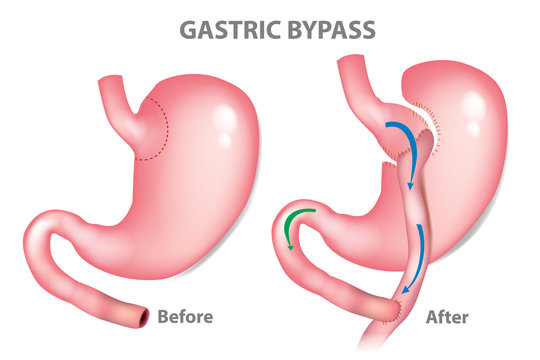
Long-Term Weight Loss Results with a Gastric sleeve & Gastric bypass Procedure
Introduction:
With the rise of obesity, more people are turning to bariatric surgery for help in combating weight gain and health issues. Two of the most popular types of bariatric surgeries are gastric sleeve and gastric bypass surgery. Understanding the differences between these two surgeries can help you make an informed decision about which one is right for you. Let’s take a closer look at how each procedure works.
Gastric sleeve Surgery
Gastric sleeve surgery, also known as sleeve gastrectomy, reduces the size of your stomach by removing part of it. This makes it easier to eat less food, as feelings of fullness occur quickly after eating small amounts. After this surgery, your stomach will be smaller and shaped like a banana or a tube, with only 1/10th its original capacity.
The benefits of this procedure include quicker recovery time, fewer risks during surgery, and no malabsorption issues—this means that the nutrients from your food will still be absorbed properly by your body. However, since this procedure does not reduce absorption as a bypass does, it may not produce as much weight loss as other forms of bariatric surgery.
Gastric bypass Surgery
difference between gastric sleeve and gastric bypass is another type of bariatric surgery that helps people lose weight by reducing the size of their stomach and re-routing part of their digestive system to bypass part of their intestines. This causes food to bypass parts of the intestine where calories are absorbed, resulting in fewer calories being absorbed by the body—which leads to weight loss. It also helps suppress appetite due to its effects on hormones that regulate hunger and satiety signals in your brain.
The benefits associated with this procedure include greater weight loss than many other forms of bariatric surgery and reduced risk factors for certain diseases such as diabetes or heart disease; however, there are some drawbacks associated with it too such as longer recovery time than gastric sleeve surgery and increased risk for malnutrition due to lack of nutrient absorption in food passing through certain parts of intestines not used during the digestion process. Additionally, some individuals may experience dumping syndrome if they do not follow proper dietary guidelines after their operation which can lead to abdominal discomfort or nausea when consuming high-sugar or high-fat foods too quickly after meals or even drinking liquids while eating solid foods!
Conclusion:
If you think that either gastric sleeve or gastric bypass might be right for you but aren’t sure which one is best suited for your needs, don’t hesitate to speak with your doctor about both procedures so that you can make an informed decision about which one is best for you based on your current health status and lifestyle habits. Ultimately both procedures offer many potential benefits when it comes to losing weight but you must take into account all factors before making any final decisions about which route may be right for you!



